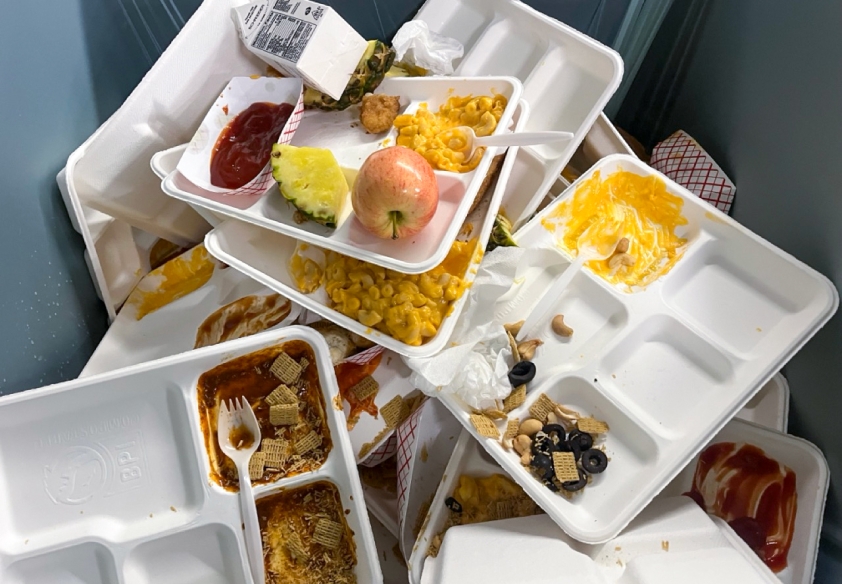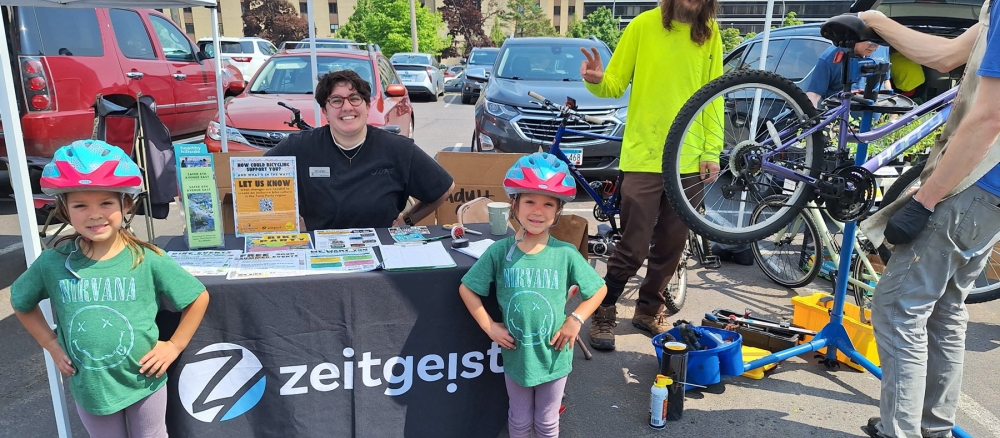Awards from recent $1 million MPCA grant round will fund projects focused on waste reduction and reuse
Every month, the Duluth Transit Authority and Duluth Police Department gather a surplus of deserted bicycles. Abandoned, unclaimed, and unable to be connected with an owner through serial numbers or other stolen bike report systems, the bikes ultimately go to a local landfill.
The organizers of a bicycle rehab program through the Zeitgeist Center for Arts and Community have made it their mission to reduce that waste and give the bikes a second life by bringing them back into the community for those in need. A recent grant from the MPCA will boost those efforts, saving hundreds of bikes and reaching more people in need.
“With support from the MPCA, we will expand the reach of our current Learn to Ride program where folks gain riding and navigation skills in a fun and social environment and receive a bike, helmet, and lock upon completion of the skills course,” said Andrea Crouse, a community development manager at the Zeitgeist Center. “The process of repairing the discarded bikes also provides an opportunity to teach more people about bike maintenance and repair, skills that will keep them riding for years to come while opening the door to employment opportunities.”
The $139,600 grant to the Zeitgeist Center is one of several from a recent $1 million MPCA grant round that will fund projects focused on waste reduction and reuse. These statewide efforts will reduce greenhouse gas emissions and other pollutants, reduce the demand for resources, and reduce the amount of waste sent to landfills.
To invest in projects that will continue to offer benefits to Minnesotans well into the future, this grant round prioritized proposals that would replace single-use items with reusables or help build a trained repair workforce in Minnesota.
“Focusing on reuse and strengthening the repair workforce have major environmental benefits and can offer significant cost savings to Minnesotans,” said Kristen Peterson, a senior reuse specialist with the MPCA. “But perhaps the greatest thing about waste reduction projects is that they are often quite local and approachable, yet the environmental benefits extend far beyond a single community.”

In the last 40 years, Minnesota has seen a gradual transformation from a system solely designed to manage solid waste to one that more holistically recognizes the complete life cycle of materials and their climate, environmental, and human health impacts. According to the Environmental Protection Agency, roughly 40% of greenhouse gas emissions in the United States are associated with the production, transportation, use, and disposal of goods; this highlights how critical it is to prioritize reduction and reuse strategies before products and materials become a waste to be managed through recycling or disposal.
This waste reduction and reuse grant round was funded in part from the materials management and solid waste grants funding package allocated by the Minnesota Legislature in 2023. Requests for funding exceeded the amount of available funds by more than four times, clearly showing the interest and demand across Minnesota for more waste reduction and reuse projects. Future funding for similar projects will likely be available in early 2026.
Grant recipients
Clean Water Fund
- Grant award: $232,510
- Project cost: $314,098
Partner with Free Geek Twin Cities and Minnesota Tech for Success to offer fix-it clinics, open shop hours, office hours, and job training in the technology refurbishment industry to fill existing gaps in community accessibility to electronic repair resources. The project aims to empower community members by offering practical skills training, personalized guidance, and structured education to facilitate device longevity and reduce reliance on new products. It will also increase capacity to repair and reuse more electronic devices, promote and educate about reused electronics, and engage with the public to get Minnesotans to pledge to buy used.
ISD 197
- Grant award: $135,750
- Project cost: $181,000
Install a dishwashing system to utilize reusable trays and utensils at Two Rivers High School in Mendota Heights to reduce approximately 250,000 disposable trays and utensils from the landfill, annually. This will eliminate the cost, waste, and environmental impact associated with sourcing, procuring, and transporting single-use trays and utensils.
Macalester College
- Grant award: $154,294
- Project cost: $194,315
Hire a full-time reuse manager who will focus on expanding access and use of the campus reuse center, establishing a digital asset management system, and expanding the use of reusable to-go containers in dining facilities.
Northern Bedrock Conservation Corps
- Grant award: $100,000
- Project cost: $125,000
Establish a St. Louis County tool library and fix-it clinic programming that will generate lasting environmental, climate, and community benefits by shifting the culture from consumption to conservation and from disposal to reuse.
r.World
- Grant award: $200,000
- Project cost: $265,740
Develop and coordinate an incentive program to encourage Twin Cities sports and entertainment venues to trial a reusable food ware program with the goal of transitioning them to reuse in the long term.
Southwest Metro Intermediate District 288
- Grant award: $75,000
- Project cost: $96,900
Partner with the Scott County Environmental Services department to offer a mobile fix-it clinic program to county residents that will provide education to residents and result in an increase in the reuse of products and the awareness of county services in the district.
Zeitgeist Center for Arts & Community
- Grant award: $139,600
- Project cost: $200,110
Expand the Bike Cave’s model in order to recover around 500 bicycles annually to be rehabilitated and reused by low-income community members through Zeitgeist’s learn-to-ride program. The project will result in waste reduction and increased cycling equity.
